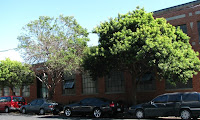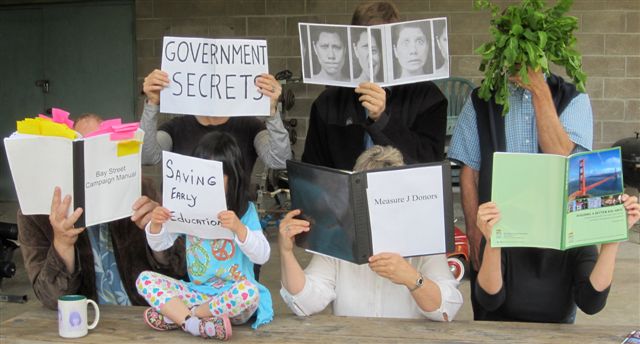
Can Emeryville Be As Tree-Friendly As Oakland Or Berkeley?
By Brian Donahue
A citizen-led drive against the incessant chopping of Emeryville’s trees led the City Council at its final August meeting to change course and strengthen the city’s tree ordinance. The Council ordered city staff to study ways to bolster the existing ordinance so it may be revised accordingly. A date for a future hearing has not been set. It seems that the Council’s declarations of arboreal love came not from their sudden realization that the city’s Urban Forestry Ordinance (UFO) failed to protect the city’s trees, but because of unrelenting public pressure.
Council member John Fricke, a vocal and longtime advocate for strengthening the tree ordinance, has stood alone among his fellow Council members in support of stronger protections for the city’s trees. After the Aug. 19 meeting, he questioned the sincerity of his colleagues:
“If the City Council actually follows through and adds broader protections to the city’s tree ordinance, the real test will come when a developer asks for a waiver.â€
Fricke cited numerous violations of other city ordinances by developers with the Council’s nod.
The tree ordinance, approved several years ago in response to citizen concerns, has been touted extensively by Council members in their re-election campaign literature. The trouble is that although Council members used the existing tree ordinance to gain re-election, the ordinance fails to actually protect trees. This has long been obvious to those paying attention in Emeryville, but two recent development projects brought the point home to many city residents. When developers of the – ironically named – Oak Walk project at San Pablo Avenue and 40th Street, and the Glashaus project at 65th and Hollis streets cut down about 20 mature trees at these two sites, it was obvious that the city’s tree law was no match for the developers’ chain saw.
The biggest problem facing Emeryville’s 3,239 (street) trees is that the tree ordinance allows developers to essentially buy the trees they want to cut down – for a pittance. The law allows developers to pay a minimum “replacement cost†required by state law. For example, $600 was the price paid for a beautiful 50-foot mature cottonwood by the Oak Walk developer. At those prices, developers are cutting down trees all over town – a fate the ordinance was enacted to stop. A plan raising the “replacement cost” for street trees would honor the original intent of the ordinance and is among the points Council members will weigh at a future meeting.
Another problem is that the existing ordinance allows an unelected government bureaucrat, the Director of Public Works, to unilaterally waive fines for those who violate the law and cut down trees without permission. This is what happened with the Pulte project called Glashaus. The entire block of public trees on 65th Street fronting the development site were cut down without permission. After this was brought to the attention of City officials, Pulte, a large national home builder, was given retroactive permission to cut the trees and all fines for breaking the law were waived. This action by the city created a precedent. The message to other developers is they are welcome to do the same. Hey, if you get caught, you’ll only have to pay the amount you would have paid had you sought permission.
Lastly, the Council is to explore the idea of protecting certain privately owned ‘heritage’ trees. Perhaps Emeryville should follow the example of its neighbors, Oakland and Berkeley, which already have such laws in place.
Brian Donahue has lived and worked in Emeryville for 28 years. He and his wife, and young daughter, live in the Emeryville Artists’ Cooperative. Brian has been a longtime activist, working for transparent government and better of quality of life for the residents; he’s not very popular with the City Council majority.


I just moved to Emeryville, what is the Emeryville Artists’ Cooperative?
The Artists’ Cooperative is a limited equity coop building purchased by artists back in the 1970s. A former manufacturing facility, the Artists’s Coop provides affordable housing for artists.